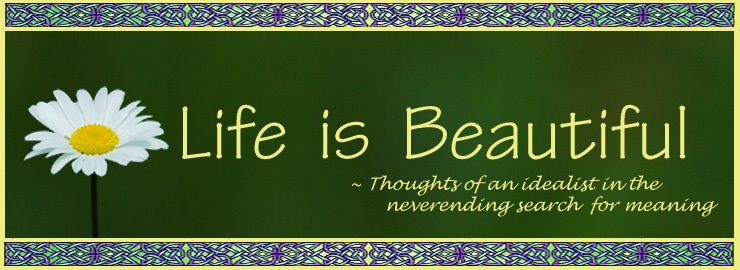
(photo shamelessly stolen from the internet, photographer unknown)
Hello, everyone! I am very sorry that I’ve seemed to disappear from the blog world. All is well. It’s just been a case of that pesky Newton’s first law: inertia.
And yes, that body at rest (me not blogging) would have remained at rest without an outside force. :P
Although I’ve been at rest in the blogosphere, I’ve been very active in my head. With my explorations into the meaning of life. Probably another case of inertia… :)
So what is the outside force that nudged me back to blogging? A new podcast series from one of the wisest counselors I’ve ever read. I am so excited about Al Turtle’s relationship wisdom that I just had to share this with all of you.
Anyone who wants to have the “perfect” relationship (romantic or otherwise) has got to listen to Al talk about his “Map of Relationships.”
One of the things that has bothered me for years is the lack of a role model for what makes a healthy relationship. Couples in books, TV shows, and movies all seem to be struggling with their relationships. It makes for good drama, of course. And everyone can relate to the humor, angst, and pain that results. But what does a healthy relationship look like? A healthy, happy couple is rarely depicted. So rare that I don’t have a model in my head of how it would work in reality. I think most of us can describe characteristics that are not part of a healthy relationship. It’s easy to see that it would not involve a power struggle or arguing. And, many of us can quickly and easily point out couples who are not healthy. But what does a healthy couple do? How does it work? It seems that most of us can describe what a perfect relationship would feel like, but I haven’t found anyone who can explain exactly how to achieve it.
Until now.
Al Turtle is an Imago trained couples counselor. He started using the ideas of Imago theory in his practice and in his own marriage years ago. And he found problems. But unlike many counselors who just plod away using the theory without questioning it, Al started taking notes on the problems. And the notes became essays that he filed on his website. And, lucky for us, Al has a unique background and skill set that I would bet is uncommon for therapists. Before he became a counselor, he was trained as an electrical technician in the Navy during the Vietnam war. He likes to fix things. He knows how to analyze and fix problems in a very concrete and practical way. He is also very skilled at drawing charts and maps. So, he was able to bring all of these skills together and create this Map of Relationships.
And now, for the next 6 weeks, he is doing an interview series (podcast) with Laura Lavigne, blog talk show host, to talk about his Relationship Wisdom. The first episode was yesterday.
So, if you have any interest in learning how to achieve “Vintage Love” or even how to improve your parenting skills (yes, really!), listen in— I highly recommend it!



13 comments:
I know there is probably plenty I could learn from such things but I'm always a bit resistant to it, I suppose. I've certainly seen some horrible advice given by 'professionals' before, but sometimes good stuff as well.
It really does sound interesting. I can feel your excitement. But to me it is like the worlds best mystery novel. I can't wait to read the end and yet a part of me never wants to. And most of all, I don't want someone to tell me the ending. I'd like to read it myself.
Okay, I might have dived too deep into analogies, but I want to find my own map. I may not, but I'll surely try!
Charles~ I understand. There is a lot of short-sightedness out there. I like this guy because he really cuts to the core of being human. Why humans need relationship, why we choose the partner we choose, and why all relationships go through the same stages (everyone is on his map somewhere). And he's got some great, practical ideas about what we need to learn to get to the vintage love stage that we all dream of.
Aniket~ The ending is the "biological dream" (as Al calls it) that we all share. To create a relationship that feels like home: safe, reliable, respectful of diversity, supportive, and fun. So you already know the ending!! :D
The kicker is-- do you have the skills to get there? Most don't. Because the only place we learn them is from our parents, but no parents are perfect. For example, most of us have been taught that obedience comes from authority. Doesn't work in a relationship. And most take what Al calls door #2 (giving up on the dream) or door #3 (leaving the relationship, just to start over and go through the same stages again...and again...), when instead, we all can choose door #1 (learn the biological dream skills) which leads to vintage love. The beauty of how we're designed is that we always fall in love with a partner who is perfect for going through door #1 with us. We are wired to choose the perfect lab partner!
:)
So keep Al's map bookmarked. Refer to it when you get lost in your own map!
For readers who would like to start with something a bit simpler for inspiration, try "A Short Guide to a Happy Marriage" (Boston Globe #1 pick) -- find at borders, amazon, etc. -- come by and visit @ www.ashortguidetoahappymarriage.com and read my little blog, Thursdays with Sharon, for some nice behaviors to give your spouse ...
Oh, I'll keep it bookmarked for sure.
I'll mostly listen to it out of curiosity too. :D
wow, I've just checked the map, and found it interesting. i wish there were some more supporting material to explain those 2-3 words attached to one phase for example.
i agree that there are far too many bullsh.t available in this topic of relationships, but this one has been offered for us by you, Aine, so this is a sure sign for me that this is worth reading/listening to.
despite of the language barrier, i'll try to get the most of it :)
I really like Imago relationship theory. I'm definitely going to check this guy out:-)
I have to admit I'm a bit cautious when it comes to charts, maps, and tests that aim to explain human personalities or relationships or any other type of human behavior. I just see the human personality as being so much more fluid and porous than any compartmentalization allows. I know there are a lot of professionals out there who know what they're talking about, but I see the human personality as a complex entity that defies understanding, most of the time, especially on an individual level. When we're dealing with relationships, it becomes more complex because now we're trying to understand two individuals, and also to understand how they communicate and interact and react with and to one another. I do applaud certain people's efforts at trying to understand us. And I don't mind using such tools as an additional resource at all, as long as I know I'm not taking any person and classifying them by a certain name or label in order to make the process easier for myself. There's always going to be deeper digging.
Nevine
Szelsofa~ There's loads of material on Al's website. Many essays that discuss each piece of the map. Plus lots of stuff about other issues (one of my favorites is his essay about "the lizard").
spldbch~ Welcome! I think you'll enjoy Al-- he fills in the holes that Imago leaves open, with such grounded wisdom.
Nevine~ I understand your caution. But I also see value in exploring the basic neuro processes that all humans have thanks to evolution. Such as our brainstem which hasn't changed much in design since it evolved in reptiles. (For example, how we are wired to have a survival response: fight, flee, freeze, or submit when threatened, even if the threat is only created in our mind.) Having the skill to create safety (prevent such percieved threats) is important in relationships. So, Al's map talks about these sort of skills. There's no labeling involved, and he's addressing a much more basic, common-to-all-humans level of behavior, not personality.
Aine, I've been hit or miss on the blog scene, too, lately. Glad to see you back.
Well, this all sounds rather interesting! I'd like to check it out to see what it's about. Thanks!
Kaye~ Glad I'm in such wonderful company! :)
Thanks for stopping by!
i think i may have to go listen to that - i'm having "inertia" issues myself - it always seems to happen at the least convenient time (i.e. looming deadlines)...and who doesn't want a better relationship!
I listened to Al and I found what he said about the couple who were constantly threatening each other very interesting. I was thinking how true this is of parents with teens who are asserting themselves. The generation I was brought up in certainly was a place full of threats - teachers, clergy, parents - all demanded absolute obedience even if the orders were contrary to the feelings of the child. It is so right to say that this atmosphere is intrinsically 'unsafe' and leads to conflict and dysfunction in relationships.
I'm hooked Aine. You've woken me from my winter sleep and I'll be along for the ride.
Post a Comment